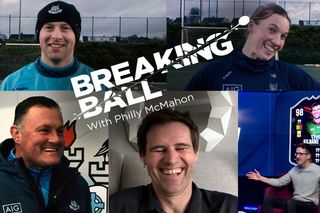‘It feels like a duty to show up, given the rise of the far right’ – trans people across Ireland on how they will mark Pride




Jamie O’Herlihy
“I think for a while, for me personally, Pride became about partying and celebrating,” says Jamie (27), a Cork-born, Dublin-based content creator who chronicled her transition on YouTube.
“I think I kind of lost the meaning behind Pride. Pride ultimately is a protest, for equality and for LGBT rights, and it’s really become about that again for me because of the way my community has been treated recently.”
She observes that when she and her sister Chloe, who is also trans, first shared their story in 2016, the media response was “like a circus”.
“My story was very sensationalised. I think we fell into that trap because we wanted to tell our story, we wanted to come out and let people know that it’s OK, but I think we were really taken advantage of and taken for a ride,” she said.
Jamie O'Herlihy
“I’m proud of my struggle and where I’ve come from. There was a point in my life where I really didn’t see a future for myself, I didn’t really know where I was going. I think to come through that and to be able to be authentically myself is what I’m proud of.”
In the years since, Jamie notes, the outlook has brightened for trans people in Ireland, but she feels the surge in press coverage has been “really difficult”.
“I’ve had to come off social media at points and really ignore what’s coming up on my feed because it just gets me down. I find it really hard to get on with things, especially if there’s another attack on an LGBT person – I’m just constantly looking over my shoulder. It fills me with anxiety,” she says, adding that she regularly disables her accounts and avoids reading the comments sections of online articles.
“It feels like our rights are up in the air again. I feel like we’re constantly being attacked, and I don’t know if the cis community knows about it or they’re just like, ‘well, it’s not happening to me, so it’s fine’, you know? I just haven’t really felt as supported.”
The lengthy waiting times for access to healthcare services are, Jamie observes, also hurting the community.
“We were one of the first [countries] to bring in the gender recognition act. Why have we moved forward in some aspects, but then in other aspects we’re back in the Stone Age?”
In the coming weeks, she will be joining both the Dublin LGBTQ+ Pride march and the Trans and Intersex Pride march, which takes place on July 8.
“I think this year, especially, will be about being louder and prouder than ever before,” she says. “And what else can we do, but keep on living our best lives and showing people that we’re not going anywhere, just because it makes some people uncomfortable?”
Read more
William Keohane
“As I’ve gotten older, my experience of Pride has changed,” says William (26), writer-in-residence at Ormston House and a facilitator of the Trans Limerick Community (TLC) peer support group.
“The first Pride I went to, as a teenager, I hadn’t come out yet. It meant so much to me to see people marching through the streets of Limerick in support, to know that coming out was possible – other people had come out and it hadn’t ruined their lives. They seemed to be happy, even.”
Last year, William took part in Limerick Pride with members of TLC, and remembers it as an “amazing experience”.
“A family friend brought her three kids and marched with us in solidarity. In front of us, as we were marching, her young son was holding up a trans pride flag as well. That was a really beautiful thing to see – he was sort of an example of what a possible future could look like, which would be that general acceptance among people.
William Keohane. Photo: Ian Martindale
“I think Pride is important for that visibility, to be able to see people like you represented, and it’s probably more important in smaller towns, where you don’t see that general representation.
“One of the things that I realised a few years ago was I hadn’t actually met a trans man who was older than me,” he added. “Obviously, when you can’t see people older than you, you don’t really know what your future is going to look like.”
When he set up TLC after lockdown, William expected a handful of people to show up, and was thrilled to see 25 people attend the first meeting. But such groups are mostly run by volunteers, and it’s a constant struggle to find meeting space. “I think funding to keep these small trans groups running would be vital, even if there was county council support available. Even the donation of space – obviously rent is really high right now, but if organisations were willing to provide that space free of charge for a group to meet, that would be really, really important.”
William also raises the provision of healthcare, noting that the reason wait times are so long is because services are centralised in one location in Dublin.
“It doesn’t need to be that way. A local GP could provide trans healthcare, but with the way the system is organised right now, they’re not allowed to do so,” he explains. “When I have to go up for appointments [in Dublin], I have to take the day off work, because it’s roughly three hours up and then three hours return. I’m incredibly grateful to have healthcare, but a broader restructuring of the system is definitely needed because it’s very clear it’s at crisis point right now.”
This year, he notes TLC will be marching in Limerick Pride, but he’s most looking forward to the smaller events planned that week, including a trans writing showcase. “Not everybody is up for the public marching, so having those other opportunities as well is great.”
For William, it is the quieter, everyday interactions that are most meaningful. “Recently, my mom’s been sick. When I visit her in hospital, and she says to the staff, ‘this is my son, he’s come to visit’, I feel proud,” he added.
Resenting to representing: Transgender activist Rebecca de Havilland on what pride means to her
Becky Cheatle
“I only came out a few years ago, so I’ve only been to one Pride parade ever. I never really paid it any attention before that,” says Becky (51), a stand-up comedian based in Dublin. This year, she had hoped to mark the weekend quietly with friends, but, she adds, “with the far-right nonsense you read about, it feels like a duty to show up”.
She recalls taking her “first awkward steps into social transition” in Waterford, where she had moved home to care for her late mother during lockdown. “I was just astonished by how nice people were. I mean, it’s a nice part of the world down there but it’s by no means unique. It’s nice to know that that’s the attitude in a fairly small town.”
Becky, who has sworn off Twitter, identifies a discrepancy between online discussions of trans issues among the “chattering classes” and the offline response, which she describes as “fantastic” because “effectively, nobody gives a sh*t, which is exactly what you want”.
“People on the street just don’t care,” she explains. “Before I transitioned, I always felt that I stuck out like a sore thumb. I didn’t feel right in my own skin, so I always felt weirdly exposed walking down the street, as if someone were going to confront me. That feeling sort of evaporated once I transitioned. I don’t feel this weird sense of shame and discomfort that I carried around, that’s gone now.
“I think I carry myself with a lot more confidence, which is I suppose ironic, because I’m sure I do stand out as a 6ft-tall, middle-aged trans woman, whereas before I was the most normal-looking person you can imagine. But for me, the feeling is completely the opposite.”
When Becky transitioned in 2021, the prospect of a 10-year wait to see a specialist was disheartening. “When you’re 50 and want to make up for a lost life, essentially, I can’t do that,” she says, adding that trans friends advised her to seek private treatment abroad.
Growing up in the mid-’80s, she recalls feeling out of place, like she was “the only one” questioning her gender.
“I didn’t have the language to deal with it, I buried it and just lived the way that I thought was expected,” she added.
“But at the same time, I’m living in a way that I never thought I would be able to,” added Becky, who will be performing at next month’s Paddy Power Comedy Festival in the Iveagh Gardens. “I could look back at it as a missed opportunity, but there’s no point in doing that. Now, I’m just happy. I got there in the end.”
Raevynna El Messaoudi
“Pride today for me is less about parties, and more about community, deep reflection and gratitude,” says Raevynna (26), a digital transformation and business analyst who is also a facilitator for the Trans Limerick Community and a board member for Transgender Europe.
She is originally from South Africa, and settled in Ireland in 2020.
“When I first planned on coming here, I was warned about the struggles I would face regarding access to hormone blockers,” she said, adding she had been using the medication for over seven years, starting when she was 16. “As a result, I was forced to undergo a procedure, at great financial and personal cost, to eliminate my need for blockers. Because of this, I can never have biological children.
“It was a choice between losing everything I had worked for for over a decade or a vague future that rarely works out for people like me.”
Raevynna El Messaoudi
As well as healthcare issues, she added that trans people are disproportionately affected by the housing crisis, and notes that she is privileged to be able to live at home. “Most trans people don’t have the same social security nets and are forced to leave their childhood homes by parents who refuse to accept them,” she said. “Many flee out of fear for their safety, ending up shelterless and in dangerous situations. When applying to rent a property, landlords refuse us after taking one look at the identity documents that don’t match our outer appearance.”
The media, she believes, doesn’t leave enough space for positive coverage of trans issues. “Every story relating to trans people that you read today is sensationalistic in nature, focusing on trans people in sports – a very small part of a very small community – or the threat that trans woman present to women’s spaces, which we have been occupying for years with zero issues, or attacks against both individuals and the community as a whole,” she said. “I wish there were more articles about trans parents raising their children with the love and acceptance they needed growing up. I wish there were more headlines about up-and-coming trans artists, showcasing the unbelievable talent in our community.”




















